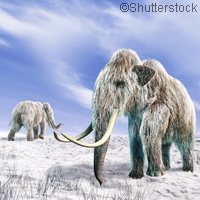People and climate change triggered big animal extinction
British researchers have discovered that human activity and climate change triggered the extinction of some of our planet's big animals over the last 100 000 years. Presented in the journal Proceedings of the National Academy of Sciences (PNAS), the study's findings shed light on how the pressures on megafauna are affecting the big animals that roam Earth today. Researchers from the University of Cambridge in the United Kingdom put the spotlight on extinctions that emerged during the late Quaternary period, from 700 000 years ago until today. Of particular interest were extinctions over the last 100,000 years. Mammoths in North America and Eurasia, mastodons and giant sloths in the Americas, the woolly rhino in Europe, giant kangaroos and wombats in Australia, and the moas in New Zealand were some of the big animals that were wiped out. Using data collected from an Antarctic ice core, the researchers also gathered data on the appearance of modern humans from Africa on five different land masses, namely North America, South America, most of Eurasia, Australia and New Zealand. Statistical analyses were performed, helping the researchers establish if humans or climate change, or both, influenced the pattern of extinctions across land masses. Based on their results, it seems both factors played a role in the big animals' extinction. 'Our research suggests that a combination of human pressure and climate change was able to cause the extinctions of many large animals in the past,' says co-author Graham Prescott, a doctoral student at the University of Cambridge. 'Many large, charismatic animals today are threatened by both hunting pressure and changes in climate; if we do not take action to address these issues we may see further extinctions. And in contrast to the people who first encountered these megafauna, people today are fully aware of the consequences of our actions; this gives us hope that we can prevent future extinctions, but will make it all the worse if we do not.' Commenting on how it has been hard to get to the bottom of this mystery, co-author David Williams, also a doctoral student at the University of Cambridge, says: 'The loss of these animals has been a zoological puzzle since the time of Charles Darwin and Alfred Russel Wallace. At that time, many people didn't believe that human-caused extinctions were possible, but Wallace argued otherwise. We have now shown, 100 years later, that he was right, and that humans, combined with climate change, have been affecting other species for tens of thousands of years and continue to do so. Hopefully, now though, we are in a position to do something about it.' Professor Rhys Green of the University of Cambridge and the Royal Society for the Protection of Birds (RSPB), who also authored the study, points out that past studies generally linked the extinction of mammoths and other megafauna to either human activity or climate change. 'Our work indicates that they had their devastating effect working together. This previous combination of unusual patterns of climate change and direct human pressure from hunting and habitat destruction is similar to those to which we are subjecting nature to today, and what happened before should be taken as a warning. The key difference this time is that the climate change is not caused by fluctuations in the Earth's rotation axis but to warming caused by fossil fuel burning and deforestation by humans - a double whammy of our own making. We should learn the lesson and act urgently to moderate both types of impact.'For more information, please visit: University of Cambridge:http://www.cam.ac.uk/PNAS:http://www.pnas.org/
Countries
United Kingdom



